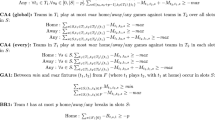Abstract
This paper addresses the general and challenging Sports Timetabling Problem proposed during the International Timetabling Competition of 2021 (ITC2021). The problem is expressed in a flexible format which enables modeling a number of real-world constraints that often occur in Sports Timetabling. An integer programming (IP) formulation and a fix-and-optimize heuristic are proposed to address the problem. The fix-and-optimize approach uses the IP formulation to heuristically decompose the problem into sub-problems and efficiently search on very large neighborhoods. The diverse ITC2021 benchmark instances were used to evaluate the proposed methods. The formulation resulted in proven optimal solutions for two instances. However, it failed to produce feasible solutions for most instances. The proposed fix-and-optimize, which uses an automatic sub-problem size calibration strategy, resulted in feasible solutions for 37 out of the 45 ITC2021 instances. Among these solutions, four are the best known in the literature. The proposed approach participated in the ITC2021 and was one of the finalists.


Similar content being viewed by others
References
Ahuja, R. K., Ergun, Ö., Orlin, J. B., & Punnen, A. P. (2002). A survey of very large-scale neighborhood search techniques. Discrete Applied Mathematics, 123(1), 75–102.
Anagnostopoulos, A., Michel, L., Van Hentenryck, P., & Vergados, Y. (2006). A simulated annealing approach to the traveling tournament problem. Journal of Scheduling, 9(2), 177–193.
Briskorn, D., & Drexl, A. (2009). IP models for round robin tournaments. Computers & Operations Research, 36(3), 837–852.
Briskorn, D., Drexl, A., & Spieksma, F. C. R. (2010). Round robin tournaments and three index assignments. 4OR, 8, 365–374.
Carvalho, M. A. M. D., & Lorena, L. A. N. (2012). New models for the mirrored traveling tournament problem. Computers & Industrial Engineering, 63(4), 1089–1095.
Cocchi, G., Galligari, A., Nicolino, F. P., Piccialli, V., Schoen, F., & Sciandrone, M. (2018). Scheduling the Italian national volleyball tournament. INFORMS Journal on Applied Analytics, 48(3), 271–284.
Costa, D. (1995). An evolutionary Tabu search algorithm and the NHL scheduling problem. INFOR: Information Systems and Operational Research, 33(3), 161–178.
Costa, F., Urrutia, S., & Ribeiro, C. (2012). An ILS heuristic for the traveling tournament problem with predefined venues. Annals OR, 194, 137–150.
de Werra, D. (1981). Scheduling in sports. In P. Hansen (Ed.), Annals of discrete mathematics (11). North-Holland mathematics studies (Vol. 59, pp. 381–395). North-Holland.
Fischetti, M., & Fischetti M. (2018). Matheuristics. In Handbook of heuristics (pp. 121–153). Springer.
Fonseca, G. H., Santos, H. G., & Carrano, E. G. (2016). Integrating matheuristics and metaheuristics for timetabling. Computers & Operations Research, 74, 108–117.
Gurobi Optimization, LLC (2021). Gurobi Optimizer Reference Manual.
Holm, D. S., Mikkelsen, R. Ø., Sørensen, M., & Stidsen, T. R. (2019). A MIP based approach for International Timetabling Competition 2019. Abstract from International Timetabling Competition, 2020, 1–4.
Kendall, G., Knust, S., Ribeiro, C. C., & Urrutia, S. (2010). Scheduling in sports: An annotated bibliography. Computers & Operations Research, 37(1), 1–19.
Kim, T. (2019). Optimal approach to game scheduling of multiple round-robin tournament: Korea professional baseball league in focus. Computers & Industrial Engineering, 136, 95–105.
Lambrechts, E., Ficker, A. M., Goossens, D. R., & Spieksma, F. C. (2018). Round-robin tournaments generated by the circle method have maximum carry-over. Mathematical Programming, 172(1), 277–302.
Rasmussen, R. V., & Trick, M. A. (2008). Round robin scheduling—a survey. European Journal of Operational Research, 188(3), 617–636.
Ribeiro, C. C., & Urrutia, S. (2007). Scheduling the Brazilian soccer tournament with fairness and broadcast objectives. In E. K. Burke & H. Rudová (Eds.), Practice and theory of automated timetabling VI (pp. 147–157). Springer.
Rosa, A., & Wallis, W. D. (1982). Premature sets of 1-factors or how not to schedule round robin tournaments. Discrete Applied Mathematics, 4, 291–297.
Santos, H. G., Toffolo, T. A. M., Gomes, R. A. M., & Ribas, S. (2016). Integer programming techniques for the nurse rostering problem. Annals of Operations Research, 239(1), 225–251.
Schreuder, J. A. (1992). Combinatorial aspects of construction of competition Dutch professional football leagues. Discrete Applied Mathematics, 35(3), 301–312.
Toffolo, T. A. M., Santos, H. G., Carvalho, M. A. M., & Soares, J. A. (2016). An integer programming approach to the multimode resource-constrained multiproject scheduling problem. Journal of Scheduling, 19(3), 295–307.
Trick, M. A. (2000). A schedule-then-break approach to sports timetabling. In International conference on the practice and theory of automated timetabling (pp. 242–253). Springer.
Van Bulck, D., & Goossens, D. (2021). Relax-fix-optimize heuristics for time-relaxed sports timetabling. INFOR: Information Systems and Operational Research, 59(4), 623–638.
Van Bulck, D., Goossens, D., Belien, J., & Davari, M. (2021a). The fifth international timetabling competition (ITC 2021): Sports timetabling. In MathSport international 2021 (pp. 117–122). University of Reading.
Van Bulck, D., Goossens, D., Belien, J., & Davari, M. (2021b). International timetabling competition 2021: Sports timetabling. Retrieved November 10, 2021, from http://itc2021.ugent.be.
Van Bulck, D., Goossens, D., Schönberger, J., & Guajardo, M. (2020). Robinx: A three-field classification and unified data format for round-robin sports timetabling. European Journal of Operational Research, 280(2), 568–580.
Wright, M. (1994). Timetabling county cricket fixtures using a form of Tabu search. Journal of the Operational Research Society, 45(7), 758–770.
Author information
Authors and Affiliations
Corresponding author
Additional information
Publisher's Note
Springer Nature remains neutral with regard to jurisdictional claims in published maps and institutional affiliations.
Rights and permissions
About this article
Cite this article
Fonseca, G.H.G., Toffolo, T.A.M. A fix-and-optimize heuristic for the ITC2021 sports timetabling problem. J Sched 25, 273–286 (2022). https://doi.org/10.1007/s10951-022-00738-6
Accepted:
Published:
Issue Date:
DOI: https://doi.org/10.1007/s10951-022-00738-6




